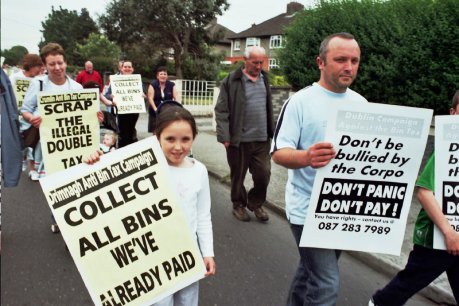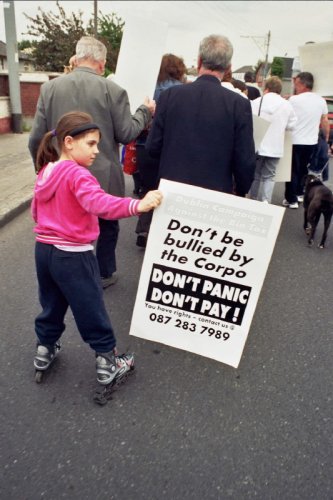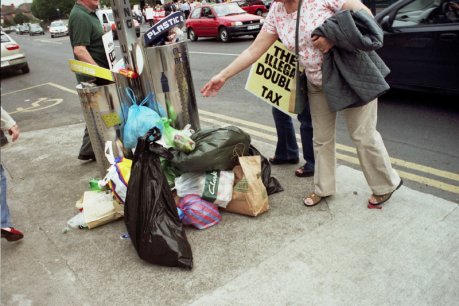|
Bin Tax / Household Tax / Water Tax
Blog Feeds
Public InquiryInterested in maladministration. Estd. 2005
Human Rights in IrelandPromoting Human Rights in Ireland
Lockdown Skeptics
Voltaire NetworkVoltaire, international edition
|
A June stroll through Crumlin. dublin |
bin tax / household tax / water tax |
news report dublin |
bin tax / household tax / water tax |
news report
 Thursday June 16, 2005 00:40 Thursday June 16, 2005 00:40 by seedot by seedot
 Bin Tax March report Report with borrowed pics (cos they are good) about the Bin Tax March in Crumlin Village on Thursday 9th June. There are not many marches that go down St Agnes road and, other than the photographer who reported 110 on the march, most of the people were waving and saying hello to their neighbours the whole way. Everybody had a placard and they made noise all the way through the streets, complemented by the horns of the cars on the other side of the road. Even as we marched out into the road there was an awareness of the rest of the community – I was told the cars behind us were just people going home from work and they were waved past at intervals. This was not about disrupting life in Crumlin – this was about demonstrating quite firmly that the anti bin tax campaign is part of life in Crumlin. The victories that have been won in the courts by the campaign were in part funded by and on behalf of people from here and while only a hundred have the time and inclination to represent the campaign on the streets nearly 3,000 people voted number one for the campaign here in the most recent election. They know that 5 years into being told that bin collection is something you only get if you pay for, 2 years after the government changed the law to try and break the link between public health and waste collection the bins are still collected here whether you pay or not. And they are determined that this will not change The people who paid six euro to join the campaign know that this has resulted in the Courts ruling that the e180 charged for bin collections in 2000/01 are illegal. Justice isn’t cheap in Ireland but people are getting organised to achieve it. The councillor that was elected on an Anti Bin tax ticket was in a car up the front leading the chants – she spoke at the end to thank everybody for coming and to tell them about the next meeting. In the clubs and pubs of the Dublin South Central constituency, hundreds of people meet regularly to get updates, talk about whose bin is being collected and sort out their neighbours’ nappies. It’s that basic – if your babys’ nappies are left in the street there are few issues more pressing. But the campaign is supporting people. In the next few months the bin tax campaign will have to talk to everybody else, to the people who only heard about it when there were stand offs in the street. It will have to tell them about the doctors who support weekly collection – either those in Ireland of 125 years ago when the public bin collection was introduced or those of today after it has been discontinued. It will have to repeat the environmental arguments that it has been making for four years and that have now been found correct in the courts. It will need to repeat the old arguments, the argument for community and looking after each other and keeping our streets and our cities clean and healthy. |






















 I went for a walk last Thursday. Myself and my family drove down to the Star in Crumlin and, leaving the car with the bingo goers, walked down to Crumlin Village as part of a relaxed march in sunny weather. If you are used to the spectacle created by the papersellers and various other regular attendees at protests in town then the number of us marching through Crumlin with our banners and chants would have looked like a disappointing Saturday afternoon – but on this particular Thursday we were buoyed up by phone reports of similar events going on around the city.
I went for a walk last Thursday. Myself and my family drove down to the Star in Crumlin and, leaving the car with the bingo goers, walked down to Crumlin Village as part of a relaxed march in sunny weather. If you are used to the spectacle created by the papersellers and various other regular attendees at protests in town then the number of us marching through Crumlin with our banners and chants would have looked like a disappointing Saturday afternoon – but on this particular Thursday we were buoyed up by phone reports of similar events going on around the city.  This is the strength of the bin tax campaign where I live. People don’t get on buses, get off and shout and then return to their lives happy that they have done their bit. They talk to their neighbours. They collect money for legal fees to defend their neighbours. They have gone to jail to ensure that their neighbours’ bins are collected They knock on doors, they go to meetings, they march, they beep their horns, they campaign.
This is the strength of the bin tax campaign where I live. People don’t get on buses, get off and shout and then return to their lives happy that they have done their bit. They talk to their neighbours. They collect money for legal fees to defend their neighbours. They have gone to jail to ensure that their neighbours’ bins are collected They knock on doors, they go to meetings, they march, they beep their horns, they campaign.
 But last Thursday the bin tax campaign in Crumlin and in loads of other locations around the city went for a walk in the Dublin sunshine and we talked to each other. Before the general election gives us our occasional chance to voice approval there will be a lot of rubbish talked. When the bin tax campaign talk rubbish, they will be talking sense, as usual. Next flier or poster you see it would probably be worth your while reading and finding out more
But last Thursday the bin tax campaign in Crumlin and in loads of other locations around the city went for a walk in the Dublin sunshine and we talked to each other. Before the general election gives us our occasional chance to voice approval there will be a lot of rubbish talked. When the bin tax campaign talk rubbish, they will be talking sense, as usual. Next flier or poster you see it would probably be worth your while reading and finding out more printable version
printable version

 Digg this
Digg this del.icio.us
del.icio.us Furl
Furl Reddit
Reddit Technorati
Technorati Facebook
Facebook Gab
Gab Twitter
Twitter
View Comments Titles Only
save preference
Comments (1 of 1)
Jump To Comment: 1I wonder will they be using their files to call to the homes of builders/developers who strew their huge amounts of garbage all over?
From Unison.ie: c/p as requires registration
First salvo in war on illegal dumping
ADVERTISEMENT
A CRACKDOWN on illegal waste dumping in the midlands this week is just the first salvo in a state-wide campaign to enforce the law, it has emerged.
Checkpoints were set up in five counties to target lorries carrying waste. Documents presented by drivers are to be cross-checked to ensure that all documented waste ends up in designated legal landfills.
The checkpoints in Longford, Offaly, Westmeath, Laois and North Tipperary followed a series of visits to waste transfer stations two weeks ago in the region.
The regional action in the midlands will be followed by similar co-ordinated action in other county council areas.
Officials from different councils are now sharing their findings so that all dumped waste is traced and accounted for.
The co-ordinator of the checkpoint operations, Roibeard O Ceallaigh of Longford County Council, said yesterday a vital part of the increased monitoring process will be the cross-referencing of documents presented by lorry drivers and waste companies.
Clusters of counties in the different regions are now working together to control more effectively the dumping of waste with the assistance of the Environmental Protection Agency.
Mr O Ceallaigh said up to 30pc of households do not use licensed rubbish collectors and the question of where they put their waste must be addressed.
His council plans to ask householders who do not use licensed refuse collectors to explain what they do with their rubbish.
Alan O'Keeffe